Hostería Cabañas del Lago overlooks the stunning San Pablo lake. Two massive mountains extend from the earth in the distance, with fog and mist constantly drifting down towards the water. The cool and damp temperatures are fitting, given the property is lined with fireplaces in each cabana, and two massive fires burning inside the hotel lobby/restaurant areas. Aside from the stunning flowers blooming in purples, pinks, reds and yellows, Hostería Cabañas del Lago very much feels like the ski town of Ecuador. Visit if you’re ever in the area!
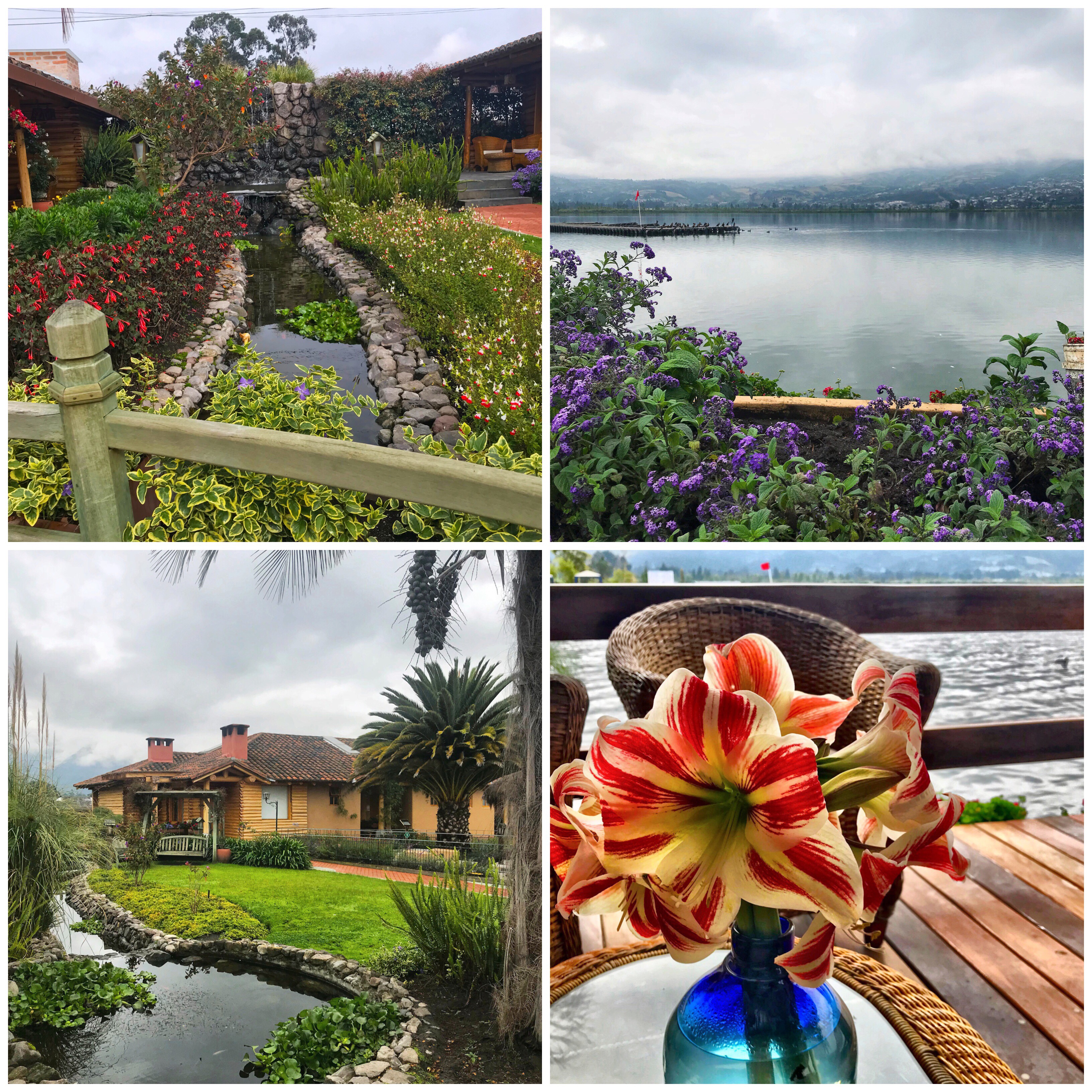
First on Thursday’s agenda was a visit to the mountainous indigenous territory of Cotacachi. We were packed and ready to hit the road by 8:30am, for our second to last day of the CARE Ecuador program. Yet again, we found ourselves surrounded by vibrant green fields, animals wandering aimlessly along the roadside, and Ecuadorians dressed in traditional ancestral garb decorating our drive. Not a dull moment, that’s for sure!
The family van pulled down a rough dirt road that seemed to be in the middle of nowhere, and coasted to a stop. I was first in line as we exited the vehicle and happily followed Nubia, our week-long CARE Ecuador field lead, down a grass laden path leading into the mountains. Behind me, a native musician began playing the flute as we hiked past the crops and homes in the small village of Cotacachi. The CARE team crawled through a wooden doorway that said ‘PRIVATE – Do Not Enter’, and as we walked into the open, the sun gave light to a beautiful field of soft grass and wildflowers with a natural spring crashing in the distance. The mountains and trees stood tall in front of us, and I thought the entire place seemed to be at peace and one with nature. It was immediately clear that we were on holy ground.
In the middle of the field there was a white sheet covered with various nuts, beans, breads, and fruits, with two women huddled in the corner adding ingredients to wooden bowls – the entire design arranged in the shape of the sun. To the left knelt a younger woman dressed in the traditional ancestral Ecuadorian clothing that protects from the cooler temperatures in the mountainous region. An elderly woman to her side was colored in a piercing pink headdress, with gold beads adorning her neck and ears; she exuded warmth and the kind of wisdom that comes only with age and life experiences. We gathered around them in a circle and the ancestral healing ceremony commenced. With music from the wooden flute reverberating from this sacred ground of Cotacachi, we experienced something truly incredible. Together, we offered the fresh fruits and grains – representing all people, all colors of skin and walks of life – to the gods and back to mother Earth. We blessed the day’s ritual and were encouraged to offer up our hearts and minds to the process. In other words, they asked us to commit and go all in!
The elderly woman grabbed a bright red carnation and dipped it into the fresh spring water bowl. As first in line she approached me, opened my hands and tossed a healthy dose of cool water onto my body and face. I was cleansed – and the other CARE Ecuador volunteers followed. Next, the young woman approached the small fire that was burning in a clay pot and began to light Eucalyptus leaves until a healthy, smoky flame developed. She approached me and blew the ash and incense over my body – first my head and shoulders and then my stomach and legs. The process continued with the rest of the group until the last individual was infused.
The importance of this ceremony cannot be understated. It is known as the waterfall healing ceremony that is used to cleanse the minds, bodies and spirits of women and children who are victims of gender-violence abuse. It is an opportunity to start fresh.
As the flute player whistled over the waters, we explored the sacred ground of Cotacachi and took in every moment of the experience. It had to be one of the best cultural engagements of my life; the colors, the offerings, the music and nature – it was incredibly moving. After saying our goodbyes, we moved down the hill towards the Ethnobotanical Garden of Cotacachi, where a group of ancestral Ecuadorians and displaced women were awaiting our arrival.
While walking past the most stunning variety of flowers, we entered a stone hut where several women were coupled around a frying pan, molding small pancakes from corn. We sat along the walls on small wooden planks and turned the conversation over to the women who made the time to join us and share their stories. Much of the dialogue was an extension of the conversations we had been partaking in all week. For ancestral territory members, the struggle includes living in remote areas where abuse is common and jobs for women don’t often exist outside of the home. Many of these women don’t have economic independence.
The other issue facing the ancestral territory includes displaced women. Due to Colombia’s long-running internal conflict, millions of displaced persons and refugees have fled the country, many of whom make their way across the border to Ecuador every year. According to statistics released by the United Nations High Commissioner for Refugees (UNHCR) in November 2010, Colombia has the world’s highest number of persons displaced by violence. The Colombian NGO Consultoría de los Derechos Humanos y Desplazamiento (CODHES) estimates that in the past 20 years, 5 million Colombians have voluntarily or involuntarily left their homes, with more than 280,000 displaced in 2010 alone. Currently there are roughly 200,000 Colombian refugees in Ecuador, but less than half of those individuals are formally recognized as such. The others are still applying for “refugee status.” One of the displaced women, Jolie, shared her personal story.
Jolie gave birth at 14 and was forced to marry at age 23. Her husband was abusive – both verbally and physically – very early on in their marriage. When they were forced to leave their native country of Colombia, she begged to stay and attempted to separate from him, but he refused. He told her that she could never survive on her own – especially without money or education. So, in order to save the lives of her three children she fled with her husband to Ecuador. Upon arrival they settled into a new home and the abuse continued as before. Jolie reached her breaking point earlier this year and began to seek help and shelter from her spouse; eventually she found herself at the courthouse in Ibarra (see yesterday’s post) filing claims against him. Furthermore, she enrolled in CARE Ecuador’s Gender-based violence training program where she used that education as power to divorce her husband. For more than 20 years, Jolie was abused. She separated from her husband just four months ago. As the tears ran down her cheeks, I couldn’t help but cry along with her and admire her bravery. She said it herself – knowledge is power and her future, free from abuse, starts now.
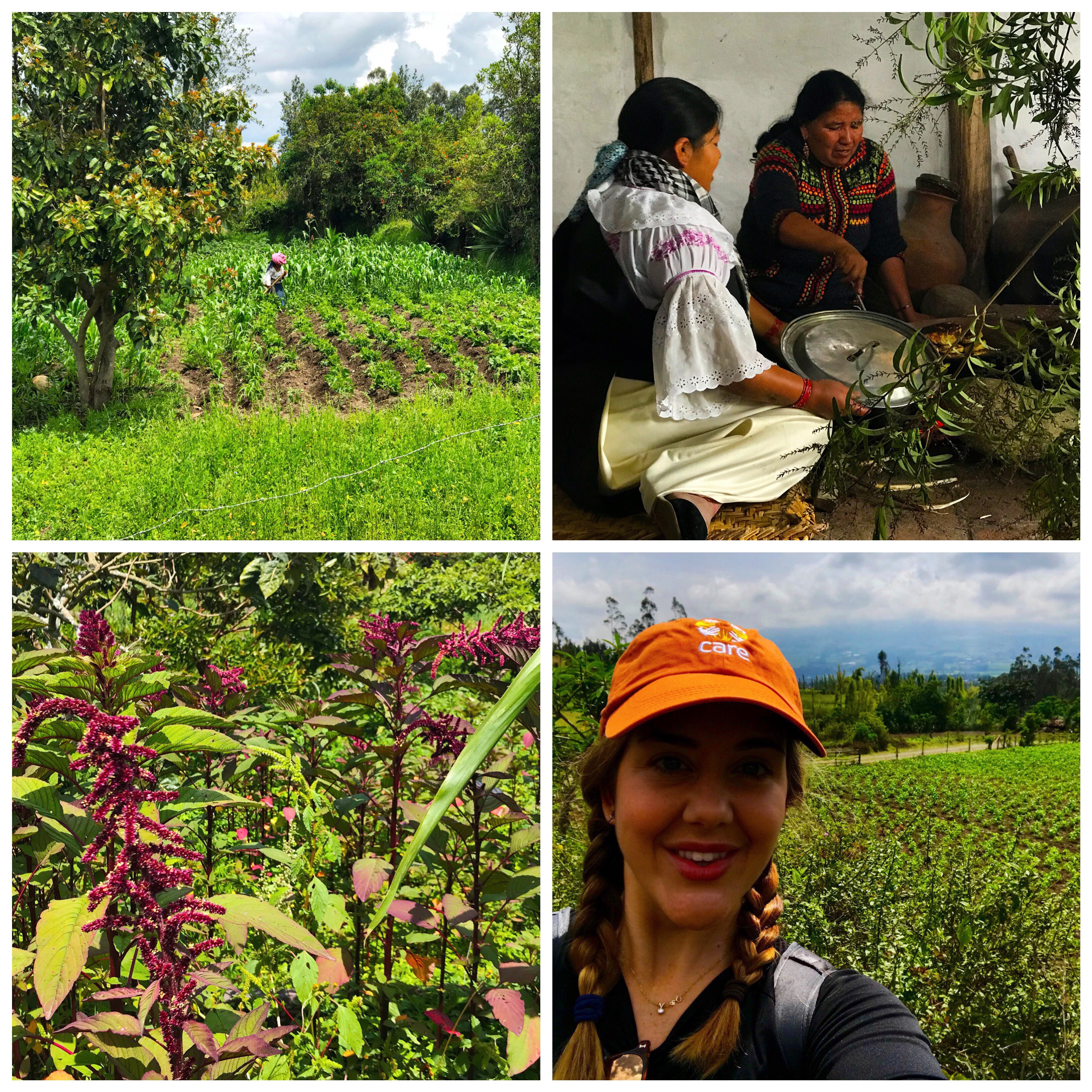
The second portion of our day was focused on yet another major issue facing women and girls globally: abuse against domestic workers. Today, there are more than 53 million domestic workers worldwide, and eight out of 10 are women. In Ecuador alone, there are roughly 300,000 domestic workers. Just as CARE has been involved in remote areas of Ecuador educating women and girls about their rights to a life without violence, they have also been working alongside domestic workers – like nannies, maids, and house keepers.
The minimum monthly wage for domestic workers in Ecuador, including social security and health insurance, is roughly ~$375.00. The actual pay typically received by domestic workers in Ecuador, sans social security and health insurance, is closer to $200.00 a month. Not only are these women seriously underpaid, but they too are often victims of sexual or physical abuse – especially those living in the same house as the families they work for. CARE Ecuador has done a massive push in tandem with other national and local non-profits, to raise awareness about this discrimination and violence. A global movement is in place and Ecuador’s link with the International Organization of Work has worked to move the needle in ensuring appropriate labor training for women in Ecuador, Guatemala, Brazil, Mexico, Honduras and Colombia. There is also a pilot project that will be launching for women in Ecuador and Colombia, known as the Agency for Domestic Workers. The hope is that this organization will create a legal platform for domestic workers in these countries, and work to certify them in various specialties so these women and girls can develop social business and advocacy processes. On November 25th when the women’s rights law is formally reviewed and approved, domestic workers will be included in the ordinance to ensure they have safe and dignified working conditions.
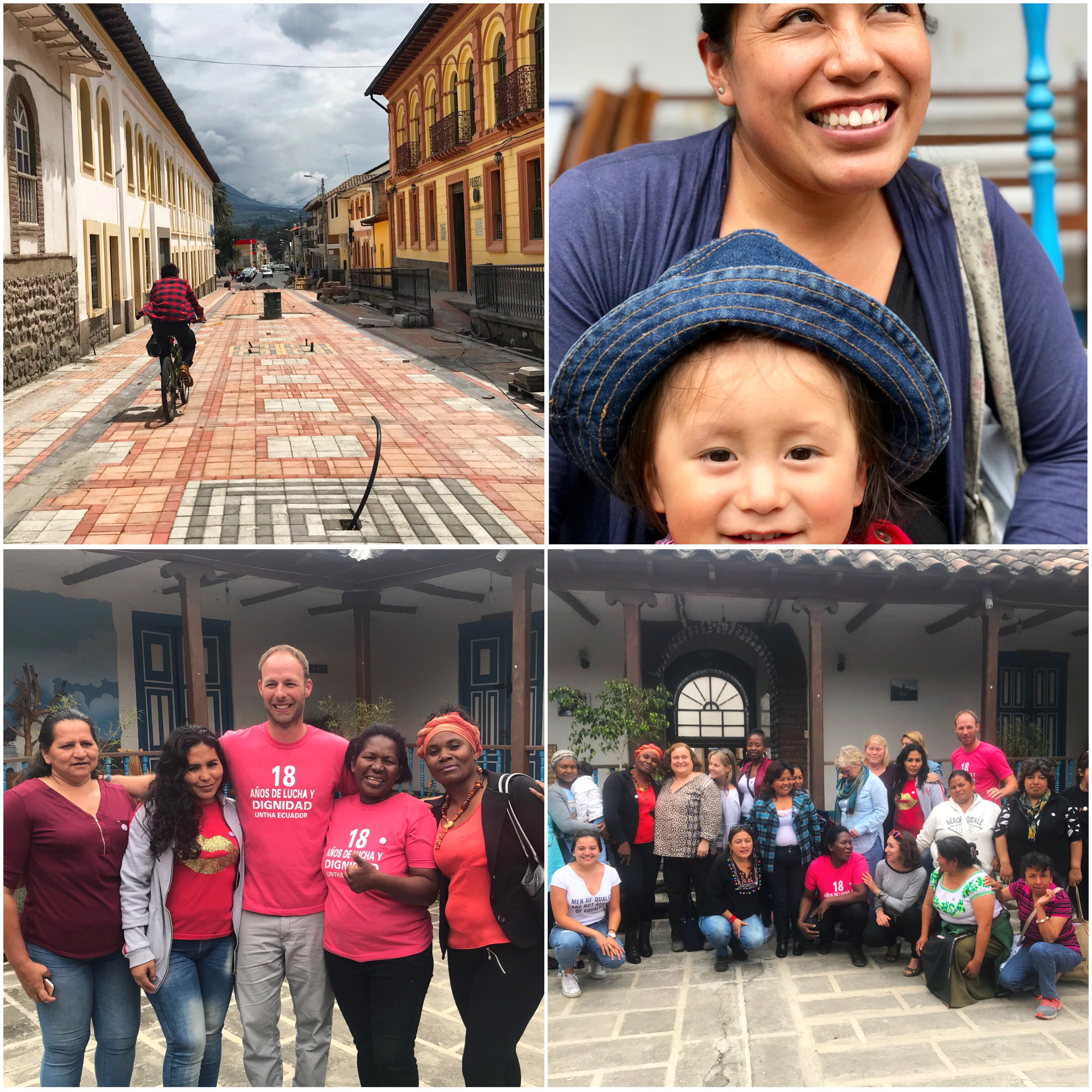
~
On our way home, we did have a short stop at the famed Otavalo Market. The market is known for it’s elaborate colors, local craftsmanship, and bustling marketplace. Unfortunately for the CARE Ecuador team, as soon as we stepped foot outside of the family van the rain began to pummel from the sky. We had all been looking forward to the experience and photo opps, but the rain simply didn’t allow for any of that. We were able to shuffle from stall to stall with our rain gear in place, determined to find the best deals. I bargained my way from vendor to vendor, collecting Christmas gifts for my family members back home. There were tapestries in every color imaginable, jewelry and crafts that were handmade with local charms and ingredients, ponchos and sombreros galore, beautiful woven blankets and rugs, and tons more! My only market #fail was securing the perfect hammock for my Dad; the one I wanted couldn’t be shipped home and was far too big to check on an airplane. Sorry, Rasta Graham – I tried!
With our plastic trash bags in town, we carted ourselves back to the van, sopping wet from the one and only torrential downpour of the trip. All in all, it was an incredible day – one of the most memorable of my global travels. And who knows? Maybe the rain was mother nature’s way of sharing in our tears and cleansing the soul on our last full day with the wonderful women of Ecuador.
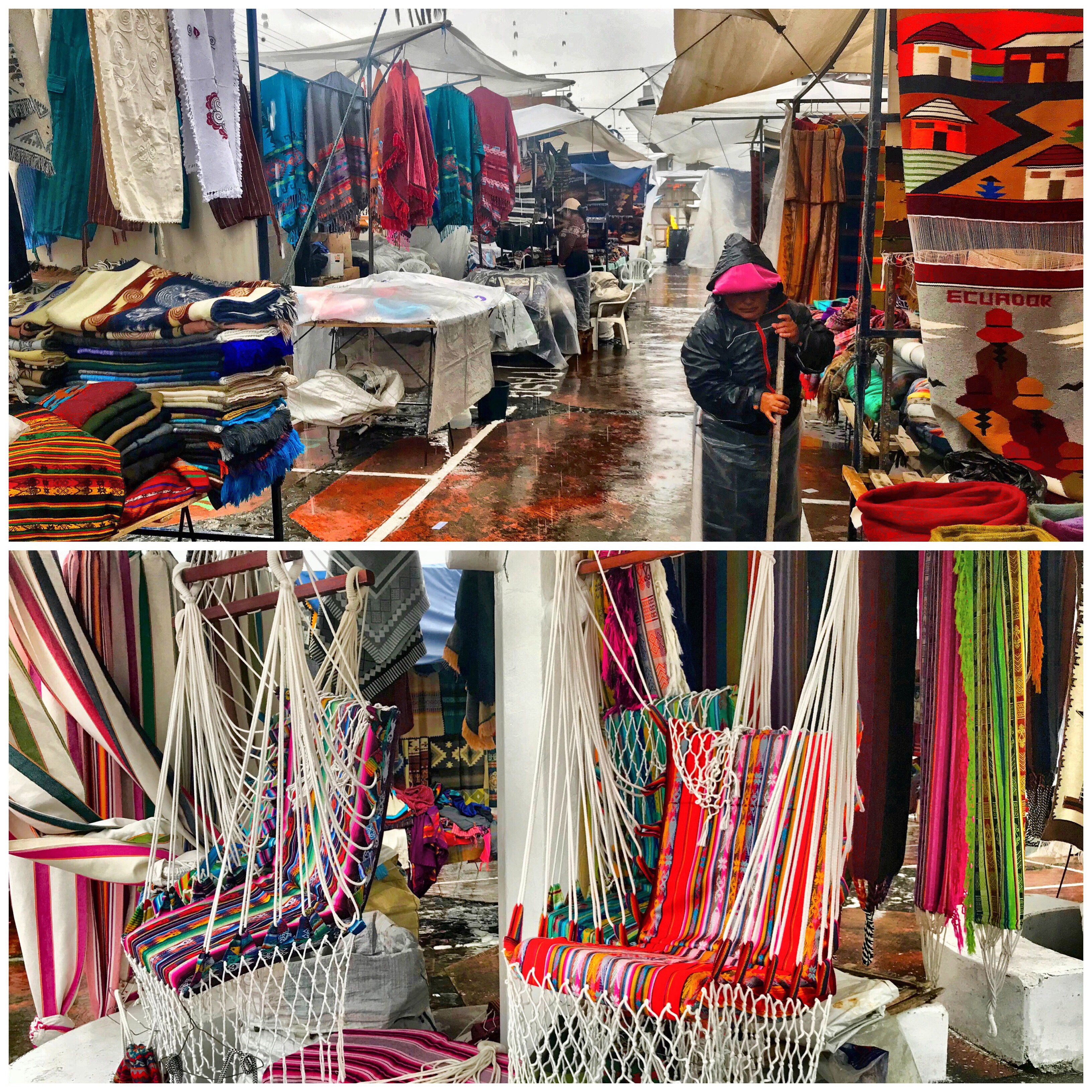
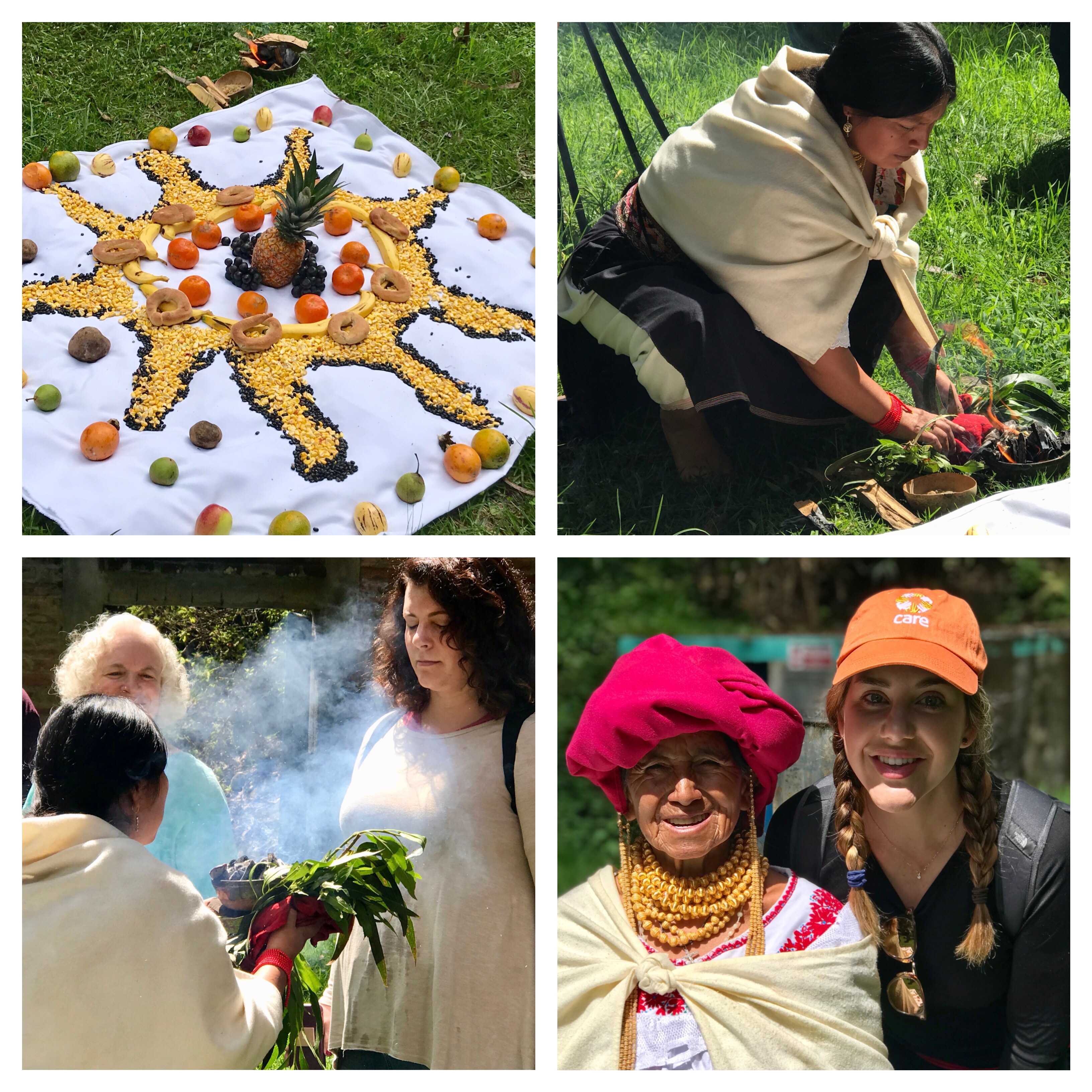
Mags you finally made it to the Otavolo Market and it pours down rain, but the spiritual cleansing experience earlier in the day sounded incredible – I have loved your CARE Ecuador experience honey so tell all those people involved they are wonderful human beings from your Dad. See you at Thanksgiving Maggie May !